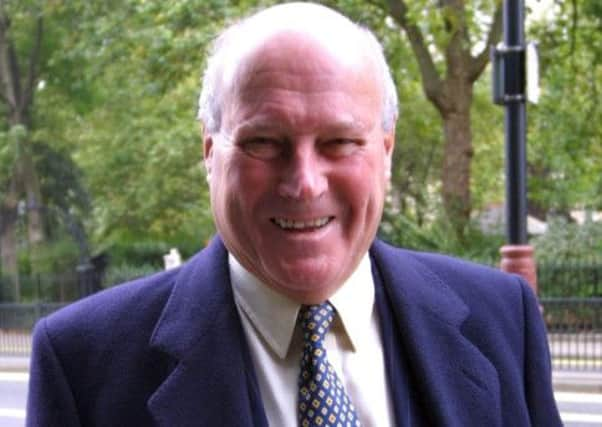Obituary: Sir Eric Parker, industrialist


Sir Eric Parker was chief executive of Trafalgar House when it was the pride of UK industry and championed by Margaret Thatcher as the new thrusting type of conglomerate she wanted to see revitalising UK industry. Trafalgar House was the brainchild of Sir Nigel Broackes and had interests in property, hotels, building and shipping. Parker managed the various assets with a canny skill. While Broackes was the front man for the operation, Parker co-ordinated the finances and the expansion into new commercial areas. He was also a keen horseman and a successful racehorse owner and breeder.
One of Parker’s most significant industrial ventures came in the 1980s and 1990s when he led Trafalgar’s expansion into heavy engineering with bids for the Clydeside shipyard of Scott Lithgow and the power-station turbine maker John Brown Engineering. Parker had spearheaded a bid for the latter in 1986 which proved to be a prudent purchase.
Advertisement
Hide AdAdvertisement
Hide AdElsewhere in Scotland, Trafalgar’s involvement proved far from straightforward – litigation with the government amounting to £27m was settled in 1991 and there was on-going debate about the ownership of Midlands & Scottish Resources oil rigs.
In fact, Trafalgar’s move into constructing oil platforms proved not entirely successful and, some years later, the Scott Lithgow yard was closed.
Parker had some crucial financial decisions to make in 1991. Not only did he settle the litigation case with the government for the sale of Scott Lithgow for about a tenth of what Trafalgar wanted but he agreed to put up for sale one of its best known assets: the Ritz Hotel in London. It was bought by the Barclay brothers in 1995 for £75m.
Eric Wilson Parker attended the Priory Grammar School in Shrewsbury and later qualified as an accountant in 1956 before doing national service with the Pay Corps in Cyprus. He then worked with the engineering giant Taylor Woodrow, moving to Trafalgar House in 1965.
Both Broackes and his co-executive Victor Matthews were major deal makers both in the UK and in the US. Parker complemented their buccaneering spirits by being a most able accountant and manager of the rapidly expanding company’s affairs.
He was appointed the finance director in 1969 and managing director in 1977.
The company rapidly absorbed Cunard, Trollope & Colls, the Ritz Hotel and Beaverbrook Newspapers. In 1991 Parker encouraged the board to expand into the engineering industry and acquired for £114m Davy Corporation. The bid would merge Davy with Scott Lithgow and John Brown into one of the most powerful engineering conglomerates in Europe.
In 1992 Parker stepped down as chief executive of John Brown and became its deputy chairman. He was succeeded by Alan Gormley.
Advertisement
Hide AdAdvertisement
Hide AdThe following year Trafalgar’s profits were under pressure and the company was the target of an equity “dawn raid” by the powerful Hong Kong Land – part of the Keswick family’s Jardine Matheson empire. The Keswick dynasty, which had its origins in Scotland, had become hugely influential traders in India and the Far East. Broackes became the new company’s president while Parker left Trafalgar.
Parker did leave with a healthy golden handshake and although he remained on several boards he concentrated his energies on horse racing.
He had owned racehorses for more than 40 years and his winners included Seagram in the 1991 Grand National – a day on which four of his horses collected £160,000 in prize money between them. Parker confessed: “I took some money off the bookmakers as well.”
His other winners as an owner included Topsham Bay in the Whitbread Gold Cup in both 1992 and 1993 and the dual Group 1 winning miler Indian Lodge.
Parker was also active in the sport’s administration. He was president of the Racehorse Owners Association and served as a board member of the Tote, the Levy Board and the National Stud. He remained involved in the management of his own beautiful Crimbourne Stud in Sussex to the end. Parker had just returned from Deauvill, where one of his yearlings had sold for a record €500,000 at a public auction.
Parker, who was knighted in 1991, was a keen golfer and played mostly on the West Sussex course. He was also a connoisseur of fine wines: he maintained a substantial vineyard on his Sussex estate.
Breeding horses and attending meetings remained a life-long passion. He bought the Crimbourne Stud when it was derelict and rundown and turned it into one of the most modern stud farms in Britain.
He once said: “I just love the whole racing business. Going racing as an owner remains the most fun, but sales time certainly has its own fascinations.”
Advertisement
Hide AdAdvertisement
Hide AdSir Eric Parker married, in 1955, Marlene Neale, who survives him with their two sons and two daughters
CONNECT WITH THE SCOTSMAN
• Subscribe to our daily newsletter (requires registration) and get the latest news, sport and business headlines delivered to your inbox every morning